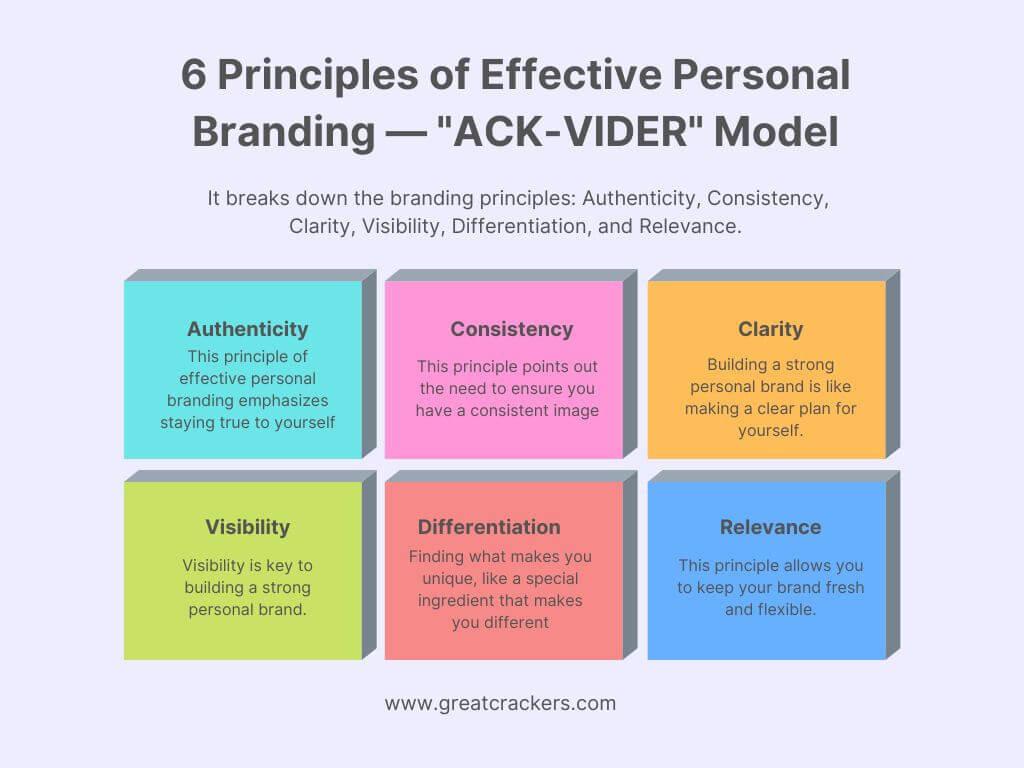6 Principles of Effective Personal Branding
Want to learn the principles of effective personal branding? If yes, then you’ve got to read this article with care.
Beyond a doubt, in today’s digital world, personal branding is key to achieving success. It’s all about being intentional in creating a unique and memorable image, and it’s more important than ever.
This blog dives into what I call the “ACK-VIDER” model. It breaks down the branding principles: Authenticity, Consistency, Clarity, Visibility, Differentiation, and Relevance.
Ready to discover how to craft a strong personal brand that stands out in today’s today’s fast and competitive world?
Before start discussing this ACK-VIDER model, let’s look at a few important things:
What is personal branding and its types?
Personal branding is shaping and promoting your identity, values, and skills to make a positive and lasting impression. It’s not one-size-fits-all; there are different types or styles to match your goals and the people you want to connect with.
Imagine you’re a graphic designer who loves bright colors and bold designs. Your brand could reflect this by using vibrant visuals in your portfolio and social media.
Of course that not only showcases your unique style but also helps attract clients who appreciate your creative approach. That’s personal branding in action!
Types of Personal Branding
There are different types of personal brands, which include the following:
1. Professional Branding
This one focuses on career growth, showing off your skills and achievements. Thus, you can think of professional personal branding as a tool for boosting your career.
That’s because it’s about showing off your skills and achievements.
For instance, consider a marketing pro who shares his successful campaigns and expertise on LinkedIn. Of course, that’s his professional personal brand at work. This way, he does his job and also showcases his skills and achievements for career advancement.
2. Entrepreneurial branding
When it comes to entrepreneurial branding, it’s about creating a business identity that reflects who you are.
Think of it like this: Imagine you start a small bakery and that you make it unique by infusing your style and personality into it.
Your brand becomes more than the cakes you sell; it’s about your personal touch, making it stand out in a way that feels authentic to you. That’s the essence of entrepreneurial branding.
3. Creative Branding
If you’re an artist or content creator, creative personal branding helps you show your unique style and make your mark.
For instance, think of a YouTuber who always includes their signature catchphrase and colorful visuals. That’s their creative personal brand, which makes them easily recognizable and memorable.
4. Lifestyle Branding
Lifestyle branding is about sharing your values, interests, and daily life. Imagine it as a way to highlight your identity.
For example, consider a person on social media who often shares posts about healthy living, fitness routines, and their love for nature. This is the person’s lifestyle brand—it reflects their values and interests and gives followers a glimpse into his everyday life.
No matter the type, effective personal branding involves authenticity, consistency, and relevancy. This ensures a strong and memorable presence both in the real world and online.
Imagine a friend who’s awesome at her job and always shares helpful posts about it on social media. That’s her professional personal brand. Of course, this allows her to flaunt her skills and build a positive reputation in her industry.
Now, think of someone who loves cooking and shares their kitchen adventures online. She’s into lifestyle branding, sharing values (like loving good food), interests (cooking), and daily life. It’s an easy yet effective way to make a personal brand others can connect with.
6 Principles of Effective Personal Branding — “ACK-VIDER” Model
Let’s grasp the essentials of effective personal branding through the “ACK-VIDER” Model. Each letter stands for a vital aspect —
A — Authenticity,
C — Consistency,
K — Clarity, (Pronounce the C as K in the acronym)
VI— Visibility,
DE— Differentiation, and
R— Relevance.
Now, let’s break down what each means:

1. Authenticity
This principle of effective personal branding emphasizes staying true to yourself. It’s about acting in line with your real identity and building trust through genuine interactions. Authentic personal brands connect because they show honesty and realness.
Take Oprah Winfrey, for example. Through authentic storytelling and connection, she forged a lasting, admired brand rooted. Indeed, authenticity is the secret to forming strong connections and nurturing a brand that lasts.
2. Consistency
This principle points out the need to ensure you have a consistent image. And that means being the same on all platforms. It’s important to keep your message strong and with a clear and familiar identity everywhere.
This way, people always see and get the same important message, whether it’s on social media, in person, or anywhere else. When you’re consistent, people trust you more, and makes your brand stronger.
For example, think of your favorite fast-food restaurant. Imagine if their logo and colors were different every time you saw them – sometimes red and yellow, sometimes blue and green. It would be confusing, right?
But because they always look the same, you can trust that you’ll get the same tasty food every time you go there. As simple as that sounds, that’s what being consistent is about.
3. Clarity
Building a strong personal brand is like making a clear plan for yourself.
First, think about what’s important to you by defining your core values, like being honest or creative. Set goals that match these values, acting as your guide. To do that, create a simple and memorable message about who you are and what makes you special.
Hence, being consistent is crucial. Imagine keeping the same style on social media, at events, and work. This builds a true brand that reflects you.
For example, as a creative and innovative graphic designer, you might set a goal to complete a special design project within a month. It’s like giving yourself a challenge to make something unique and cool in a short amount of time.
Thus, you can craft a clear message, such as “I bring fresh and imaginative designs to life through collaboration.”
After you’ve figured this out, ensure to use the same message when you post on social media, talk at events, or update your professional profiles. This makes it easier for people to get what you’re all about—your identity, values, and goals. Doing this strengthens your brand as a creative and collaborative designer.
4. Visibility
Visibility is key to building a strong personal brand. That’s why you need to ensure people know about your skills, values, and successes by being active on different platforms.
Also, connect with others, show off what you’re good at online, and join important conversations.
By always being visible in your field, you build trust, grow your network, and make your brand positive and stand out. It’s like ensuring everyone knows who you are and what you’re great at.
Imagine you’re at a big event, and everyone is talking about a hot topic. Joining in on those conversations is like being visible online. It’s your chance to share your thoughts, show your expertise, and make a lasting impression on everyone there. The more you do this, the more people will know and remember you for what you bring to the table.
5. Differentiation
Finding what makes you unique, like a special ingredient that makes you different. It could be your love for solving problems or your talent for making people happy. Show off these qualities to stand out. Embrace what makes you special—don’t hide it.
Like a chef adds a special spice to a dish, your unique qualities add flavor to your brand. By being yourself, you create a brand that people can connect with ease and remember.
Imagine you’re good at fixing things or always bringing a positive vibe to a group. That’s your unique flavor. Don’t be afraid to let it shine. It’s like a chef using a secret spice in his or her famous dish. People will remember and appreciate your special touch like they remember a dish made with that secret spice.
6. Relevance
This principle allows you to keep your brand fresh and flexible. It’s like a tech expert who updates software to meet user needs.
Relevance as a branding principle helps you stay in tune with what your audience wants by sharpening your skills. Think of it like how a smartphone stays popular with regular updates. Your brand stays in demand when it meets the current expectations of the people you want to impress.
See yourself as someone who’s always learning new things or adapting to changes. It’s like how a phone gets better with updates.
By staying relevant and meeting the expectations of the people around you, you become someone they appreciate and want to be around. It’s like being the go-to app that everyone loves to use because it’s always improving and staying cool.
Professional image vs. Personal branding
Professional image is how you present yourself at work. It includes things like dressing well and communicating effectively. It’s crucial for making a good impression. For instance, dressing appropriately for a job interview helps.
Whereas, a personal brand is the impression you create, not only at work. It includes your skills, values, and uniqueness. Having a strong personal brand, like being an expert in marketing and sharing insights online, helps you stand out and shape how others see you.
Tools and Strategies for Personal Branding
1. Online Presence
Your online presence is a crucial tool for building your brand. Think of social media as your stage, where being yourself and keeping things real makes you more visible.
Having a personal website and blog is like putting your story out there, showing what you’re good at, and letting your personality shine.
Also, through an online portfolio, you can showcase your wins and make your achievements more real. These strategies work together to create a strong digital identity. It also shapes how people see and connect with your personal brand.
2. Networking
Think of networking as a powerful way to boost your personal brand. It’s about building meaningful professional relationships. You can attend industry events or conferences to meet people in person and use online platforms for virtual connections.
By forming real, authentic relationships, you make your brand more visible. This not only opens doors to new opportunities but also helps you gain trust and credibility in your professional community.”
3. Professional Development
Developing your skills is crucial for building your personal brand. It’s like showing you’re always learning and getting better at what you do. In this process, having a mentor is essential. That’s because mentors can help you grow in your career.
When you keep improving in your job, it makes people trust you more and makes your brand look like a top player in your field.
4. Storytelling
Think of storytelling as a strong tool for making your personal brand stand out. It’s like telling a captivating story that people can relate to, creating a deeper connection.
The magic of storytelling is that it lets you share your real self—your values, experiences, and authenticity. This makes your personal brand unforgettable and leaves a lasting impression on others.
Imagine you’re sharing a story about overcoming a challenge at work or a funny experience from your life. That’s storytelling! It’s like letting people see the real you.
When you share these stories, it’s not just about the details—it’s about making a connection. People remember the story, and in a way, they remember you. It’s like being the person everyone likes because you have interesting and relatable stories to tell.”
Final Thoughts
We’ve explored the basics of personal branding and its various types. Specifically, we delved into the “ACK-VIDER” Model, which outlines six key principles for effective personal branding.
These principles—authenticity, consistency, clarity, visibility, differentiation, and relevance—can boost your personal brand. It doesn’t whether you’re just starting or a seasoned professional.






